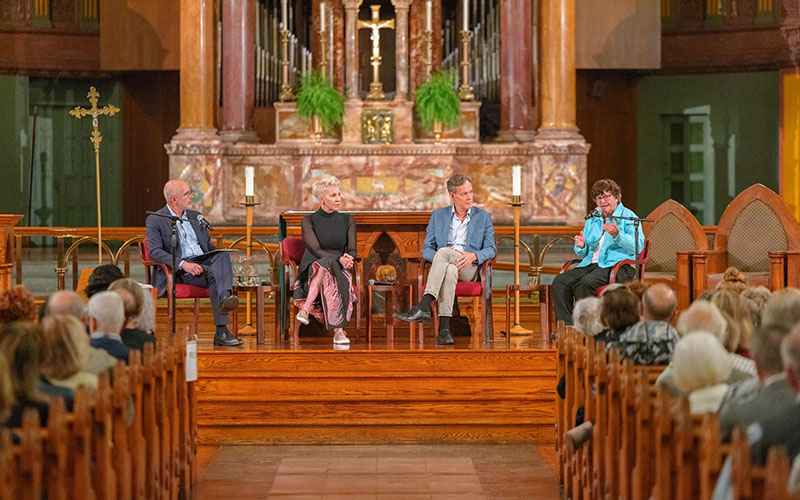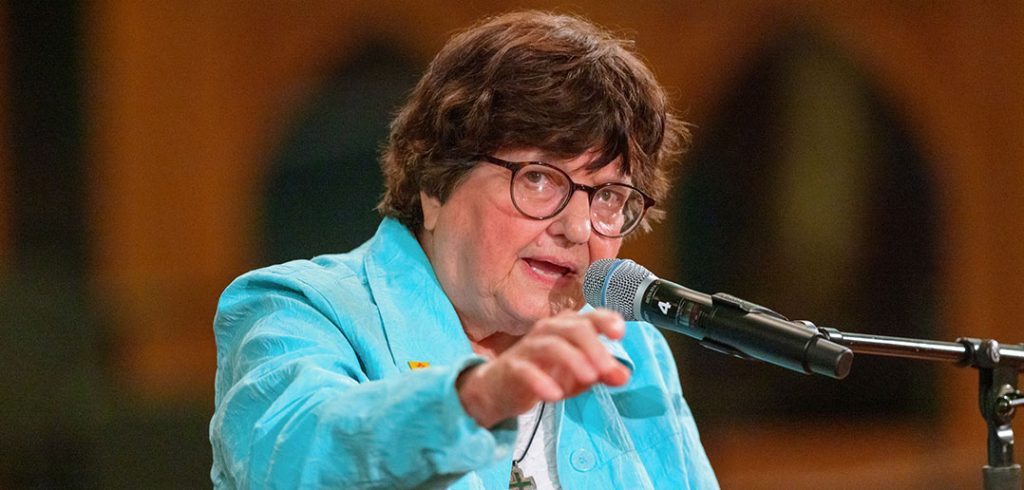But Sister Helen Prejean is not your typical nun.
Her bestselling memoir, Dead Man Walking, and later its Academy Award-winning film adaptation, are the basis of an opera that will open this year’s season at the Metropolitan Opera.
On Sept. 22, days before the opening, Sister Prejean discussed her work and the opera it inspired alongside composer Jake Heggie; mezzo-soprano Joyce DiDonato, who is starring as Sister Prejean in the production; and David Gibson, director of Fordham’s Center on Religion and Culture.
Among her admirers in the crowd was Tania Tetlow, president of Fordham University, whose opening remarks highlighted how Sister Prejean’s story has transformed lives and galvanized social action.
“My father used to tell me that most people think Jesus was just kidding, but Helen Prejean took Jesus and the Beatitudes quite literally,” she said. “As a fellow Catholic woman from New Orleans, I’ve spent my life aspiring to have the courage of Sister Helen Prejean.”
Ministry on Death Row: Meeting the ‘Ambivalence in Your Own Heart’
The opera, like the 1995 film and memoir before it, chronicles Sister Prejean’s journey as a spiritual advisor to a convicted murderer on death row and all the thorny moral contradictions that come with it. As she reflected on her story’s remarkable success and longevity, Sister Prejean pointed to her willingness to embrace contradiction as the key reason for its staying power.
“I was scared out of my mind when I first went on death row,” she recalled. “But then looking into those eyes for the first time, I went, ‘My God, he’s a human being.’ That’s what you’ve got to do on a journey. You’ve got to go into both sides and meet the ambivalence in your own heart.”
Heggie, who wrote the opera alongside the late playwright Terrence McNally, has seen it go on to more than 70 productions in countries across the world since its debut in October of 2000. Heggie believes the timeless nature of Sister Prejean’s story—and the big questions it asks—are key reasons the piece continues to resonate, as evidenced by the star-studded crowd at its Sept. 26 Met Opera premiere.
“It’s a very intimate story with large forces at work, which raise the stakes to life and death at every moment,” he said. “That’s the formula for a great tragic opera.”

A Humbling Experience for Audiences and Performers
DiDonato, a celebrated mezzo-soprano, has sung the role of Sister Prejean four times over the opera’s two-decade history and will do so again at the Met this year. An activist as much as an artist, DiDonato plans to do her part in living Sister Prejean’s mission by singing in a condensed production of Dead Man Walking at the Sing Sing Correctional Facility in the near future.
“Being able to walk in those shoes is incredibly humbling,” she said of playing the role that has been a signature one in her distinguished career. “I think it’s true for all of us that encountering this piece, you leave changed … transformed, somehow.”


